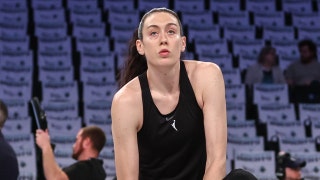Cape Coral, FL – I couldn't have been the only one, right?
Seriously, as everyone else either tuned in live or caught an online stream of the Saturday fight card from Wembley Arena - and then saw how the heavyweight portion of the feature bill ended - I wasn't alone in thinking, "C'mon, there's got to be a way to overturn that."
Had we been tuned into anything else on North American shores, officials would have simply gone under the replay hood (NFL), taken a look at courtside monitors (NBA), ducked into the umpire's room (MLB) or made a call to central command in Toronto (NHL) to make sure justice was done.
It's the right thing to do, a no-brainer in every sense of the phrase.
And, having gotten used to the minor inconveniences involved with the major sports trying to get it right, I was perfectly fine with standing around waiting for it here, too.
I was sure they'd take a quick break, rewind the Box Nation broadcast reels and notice very quickly that as soon as referee Phil Edwards indicated he'd reached the count of nine, Malik Scott got up. And having noticed this, the error Edwards had made in waving matters to a close would have been overruled - and a competitive fight, if not a thrilling one, would have evolved to its natural conclusion.
But then I remembered... "This is boxing - where reason goes to die."
Instead, Dereck Chisora was awarded a win he hadn't yet earned, Scott was handed an L he certainly didn't yet deserve, and a smattering of observers headed by ESPN's normally rational Dan Rafael was left to incorrectly opine that the victim was somehow more at fault than the perpetrator.
Last time I checked, folks, 10 means 10.
Which also means that even if a fighter decides to take the max time allowed to make sure his head is clear before rising - nine, for example - he still doesn't deserve to get "screwed" for doing so.
Lest anyone think this is about Scott and Chisora, though, it's really not.
In fact, it's far bigger than the both of them combined.
Rather than using the error to demand a desultory rematch between one guy who's overrated at 13th in the world (Scott) on the IBO computer and another who's undervalued at 41st (Chisora), the aftermath of this mess really ought to be used to make sure it doesn't reoccur in a far more inopportune spot.
On a September pay-per-view show in the Las Vegas desert, for example; where a similar controversy would bring to a screeching $75 halt all the momentum the sport has gained in a stellar 2013.
Imagine a cut over Danny Garcia's eye that's caused by a butt but is incorrectly ruled as a punch. The fight ends and Lucas Matthysse is declared the winner by a TKO. Or envision that Floyd Mayweather, Jr. slips to the canvas and has it wrongly ruled a knockdown. He loses a round by a 10-8 count instead of 10-9, which becomes the decider in a history making split-decision loss to Canelo Alvarez.
Think it can't happen? Think nobody would notice? Think again.
It'd be a cover story in Sports Illustrated, a lead story on SportsCenter and the stuff of blooper reels in perpetuity, backed by the inconvenient soundtrack of "another black eye for boxing."
And that's why someone's got to solve the problem before it arises.
Whether it's a cable company, a pay-per-view provider, a promoter or a sanctioning body who makes the first demonstrable move, it's the responsibility of those very power brokers - in the collective place of a traditional commissioner - to make sure it's not a risk that's being run going forward.
They need to make the investments, enable the logistics and clear the hurdles needed to allow enough cameras in enough places to ensure every potentially decisive moment - butt, 10-count, slip or otherwise - stands up to scrutiny. Just like the fumbles, foul balls, late jumpers and no-goals do in the sports that have long since done so.
It might add time between rounds. It might overturn popular verdicts in raucous hometowns.
But it also might save a new generation of fans from being turned off every time the same old nonsense is allowed to pass with little more than the same old flaccid outrage.
For a sport habitually conditioned to do the least it can do, now's the time to finally do more.
This week's title-fight schedule:
SATURDAY
IBF featherweight title - Macao, China
Evgeny Gradovich (champion) vs. Mauricio Munoz (No. 1 contender)
Gradovich (16-0, 8 KO): First title defense; First fight outside United States
Munoz (26-3, 12 KO): Second title fight (0-1); Third fight outside Argentina (1-1)
Fitzbitz says: "New incumbent was a surprise winner in his title-fight debut and should make it two in a row en route to a rematch with the man - Billy Dib - he upset to win the belt." Gradovich by decision
WBA/WBO flyweight titles - Macao, China
Juan Francisco Estrada (champion) vs. Milan Melindo (No. 1 WBO contender)
Estrada (24-2, 18 KO): First title defenses; Won title belts in first fight in China (April 2013)
Melindo (29-0, 12 KO): First title fight; Third fight outside the Philippines (2-0)
Fitzbitz says: "Estrada sprung a big surprise in his Chinese trip, but may well find himself on the other end of the shock this time around. Melindo is a live 'dog with some nice wins, too." Melindo by decision
NOTE: Fights previewed are only those involving a sanctioning body's full- fledged title-holder -- no interim, diamond, silver, etc. Fights for WBA "world championships" are only included if no "super champion" exists in the weight class.
Last week's picks: None
2013 picks record: 41-24 (63.1 percent)
Overall picks record: 504-176 (74.1 percent)
Lyle Fitzsimmons is a veteran sports columnist who's written professionally since 1988 and covered boxing since 1995. His work is published in print and posted online for clients in North America and Europe. Reach him at fitzbitz@msn.com or follow him on Twitter: @fitzbitz.








































